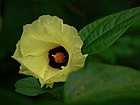Note: This is a project under development. The articles on this wiki are just being initiated and broadly incomplete. You can Help creating new pages.
Thespesia lampas
Thespesia lampas is an erect, slightly branched, evergreen shrub growing to 2 - 3 metres tall. The plant is harvested from the wild for local use as a medicine and source of fibre and dyes. It is sometimes cultivated in Africa.
Contents
- 1 Uses
- 2 Parts Used
- 3 Chemical Composition
- 4 Common names
- 5 Properties
- 6 Habit
- 7 Identification
- 8 List of Ayurvedic medicine in which the herb is used
- 9 Where to get the saplings
- 10 Mode of Propagation
- 11 How to plant/cultivate
- 12 Commonly seen growing in areas
- 13 Photo Gallery
- 14 References
- 15 External Links
Uses
Gonorrhea, Syphilis, Jaundice, Inflammation, Hyperacidity, Epistaxis, Bronchitis, Cough, Dysentery, Fever, Sun stroke, Carbincles.[1]
Parts Used
Chemical Composition
It contains Steroids, starch, alkaloid, flavonoids and proteins. Preliminary phytochemical analysis revealed presence of glycosides, phenolic compounds, tannins, steroids, saponins, flavonoids, carbohydrates and proteins.[2]
Common names
| Language | Common name |
|---|---|
| Kannada | ತುರುವೆ Turuve, ಅಡವಿಬೆಂಡೆ Adavi bende |
| Hindi | Jangli bhindi |
| Malayalam | Katthurparathi |
| Tamil | Kattupparutti |
| Telugu | Adavi benda |
| Marathi | |
| Gujarathi | Jungli bhindo |
| Punjabi | |
| Kashmiri | |
| Sanskrit | Vanakarpasah |
| English | Ban Kapas, Common Mallow |
Properties
Reference: Dravya - Substance, Rasa - Taste, Guna - Qualities, Veerya - Potency, Vipaka - Post-digesion effect, Karma - Pharmacological activity, Prabhava - Therepeutics.
Dravya
Rasa
Guna
Veerya
Vipaka
Karma
Prabhava
Habit
Identification
Leaf
| Kind | Shape | Feature |
|---|---|---|
Flower
| Type | Size | Color and composition | Stamen | More information |
|---|---|---|---|---|
| {{{5}}} |
Fruit
| Type | Size | Mass | Appearance | Seeds | More information |
|---|---|---|---|---|---|
Other features
List of Ayurvedic medicine in which the herb is used
Where to get the saplings
Mode of Propagation
How to plant/cultivate
Commonly seen growing in areas
Photo Gallery
- Https://commons.wikimedia.org/wiki/File:Thespesia lampas 02.JPG
References
- ↑ Indian Medicinal Plants by C.P.Khare
- ↑ Chemical constituents
- ↑ Common names
- ↑ [Morphology]
- ↑ Cultivation
External Links
- Pages with broken file links
- Ayurvedic Herbs known to be helpful to treat Gonorrhea
- Ayurvedic Herbs known to be helpful to treat Syphilis
- Ayurvedic Herbs known to be helpful to treat Jaundice
- Ayurvedic Herbs known to be helpful to treat Inflammation
- Ayurvedic Herbs known to be helpful to treat Hyperacidity
- Ayurvedic Herbs known to be helpful to treat Epistaxis
- Ayurvedic Herbs known to be helpful to treat Bronchitis
- Ayurvedic Herbs known to be helpful to treat Cough
- Ayurvedic Herbs known to be helpful to treat Dysentery
- Ayurvedic Herbs known to be helpful to treat Fever
- Ayurvedic Herbs known to be helpful to treat Sun stroke
- Ayurvedic Herbs known to be helpful to treat Carbincles
- Herbs with Roots used in medicine
- Herbs with Fruits used in medicine
- Herbs with common name in Kannada
- Herbs with common name in Hindi
- Herbs with common name in Malayalam
- Herbs with common name in Tamil
- Herbs with common name in Telugu
- Herbs with common name in Gujarathi
- Herbs with common name in Sanskrit
- Herbs with common name in English
- Habit - Evergreen shrub
- Index of Plants which can be propagated by Seeds
- Herbs that are commonly seen in the region of Open places
- Herbs that are commonly seen in the region of Thickets
- Herbs



